How to create successful PPC campaigns for niche markets
In the world of digital marketing, the term niche has come to encompass many different meanings.
Niche is often used to denote a specialist in a particular industry, for example, a retailer who only provides sunglasses, rather than selling multiple attire.
In the increasingly competitive arena of paid search, you will frequently encounter the term niche marketing in relation to ‘finding your perfect niche’. If a business can discover topics, keywords, products and services where there is high demand but, as of yet, low competition, they will have hit upon a ‘profitable niche’. They will succeed in filling a gap in the market. This is a desirable tactic for those in highly competitive industries, which tend to have expensive CPCs.
While these applications of the term niche marketing are common, they are not truly accurate. The adjective niche actually means products or services which appeal to a small and specialised section of the population.
You will find a wealth of information available from PPC blogs on finding a profitable niche and how to find high volume terms with low competition but what about those businesses who are already in a genuine niche industry?
These businesses cater to a specific and much smaller market than those who have chosen to specialise in sunglasses or accountants especially for contractors.
Those who specialise in true niche industries, such as gothic fashion or a world-first invention, have a very different problem when it comes to PPC: low search volume terms.
If used properly, PPC can still be a fantastic tool for niche marketing. It is the ideal way to drive interest and traffic for innovative new products and existing niche industries.
These days there is a product for almost anything you can imagine… and some things you would never fathom.

AdWords campaigns can open-up new audiences for these weird and wonderful items and services. Unfortunately, having low search volume around high intent keywords creates a number of challenges for PPC marketing in niche businesses:
- They suffer from rapid saturation of the market
- While there are less competitors, the small audience often means competition between those few industry leaders is fierce
- Some or most of your relevant keywords may have such low search volume that AdWords won’t run your ads
- All these issues are problematic but ads not running due to low search volume is by far the worst.
Many advertisers have encountered the awful low search volume message in AdWords:
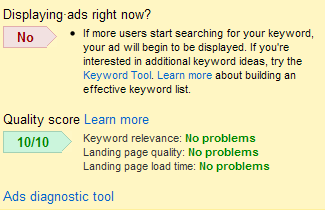
If ads will not show for the majority of relevant keywords, because your specialism is so niche, it can incredibly frustrating.
Looking at the following chart, we can see the highly accurate keyword is reported as having no search volume. This means AdWords is unlikely to let ads run for this term, even if the keyword is relevant to the product and a small number of people are searching for it.

Some PPC experts have shown that Google is not 100% accurate when it comes to determining search volume. Often there is some volume around these terms. If there is just a small amount over a longer period AdWords may not regard it as sufficient.
It is, therefore, easy to see why niche industries would doubt the benefits of PPC and feel Google is biased against them. After all, Google confirms that 15% of searches have never been conducted before and Calculate Marketing performed tests to show that there is often some volume around these so-called no volume terms and higher than average CTRs.
Even with low volume terms, competition can be present in niche marketing. Niche advertisers not only have to deal with low clicks, they may not be guaranteed the benefit of low competition and lower CPCs.


Should niche businesses bother with PPC?
Despite the many challenges, PPC can still be an excellent opportunity for niche marketing.
A smaller target audience is not necessarily a bad thing. Most PPC advertisers, especially those in competitive industries, utilise high levels of segmentation to drill down to smaller audiences in order to achieve conversions.
As we know the more refined your targeting, the more relevant your audience and therefore the greater likelihood of conversions and good ROI.
For niche industries targeting existing subcultures, much of this work is done for them. By targeting your business model at existing subcultures within the population, a great deal of segmentation and targeting has already taken place.
Businesses in niche markets also tend to have a better understanding of their audience, as the pool is small to begin with. Although there is less data, it is easier to analyse the kind of customers you appeal to.
The key to making PPC work for niche marketing is to not treat it like other industries but on a smaller scale. You need to adopt a revised model. Niche marketing has unique customers and strategies to match. By having an intelligent approach to keywords, targeting and PPC strategies you can still succeed.
Keywords for niche industries
Normally, when selecting keywords, you would look for which terms are relevant, have search volume and express intent. With niche markets, it often helps to first examine the questions: who is your audience and what relationship do they have with your potential target keywords?

This is particularly relevant for niche markets who cater to an existing subculture. Subcultures can be any niche interest group within the larger mainstream interests of the population e.g. fans of manga, industrial metal music, knitting etc. Subcultures are usually associated with B2C industries but can relate to B2B, especially highly technical industries.
To solve the problem of low search volume, niche advertisers need to think outside the box. In an effort to push conversions, it can be tempting to choose very specific, high intent terms. For competitive industries with plenty of search volume and mainstream products/services this technique is ideal. If you are in a niche industry these could lead to your ads not running.
In the event your keywords do have just enough volume to run your ads, you still risk rapid saturation of your audience because there just aren’t as many of them.
There is a propensity among PPC advertisers to avoid more general terms because they express less intent (the customer is further from converting) and the keywords can cost more. Yet in niche marketing advertisers need to embrace these terms.
The likelihood is many of your keywords will still be fairly obscure and have potentially lower CPCs but at least enough volume to run the ads. If you service a fashion subculture consider targeting the subculture as a whole rather than the product terms e.g. ‘steampunk fashion’ might be a better idea than targeting ‘brown and brass petite steampunk corset with a detachable pocket watch.’ It is likely some in the subculture’s community will want exactly that product but to maneuver around AdWords strict volume requirements you may have to think broader and trust your heavily invested fans to do a little more digging on your website from the ads.

By being brave enough to target more general terms and match types, niche markets will have their ads running in no time. While it may mean that they have a longer conversion funnel, it does have the advantage of attracting a bigger audience.
Niche markets should think of their audience and keywords in several categories:
Your fans – These are your existing customers or those who know of you and are in the consideration phase of research. They are searching for your business name or product/service specific keywords.
This is the audience you are targeting with branded keywords. They are a very small pool but loyal to your niche.

By going branded on some more general keywords related to your niche, you have the advantage of ads successfully running and the loyalist fans quickly spotting you and knowing you have the right products.
The subculture’s fans – These users have not heard of you but are die-hard fans of your niche industry. They are searching for your product/service specific keywords.

These fans are also quite likely to convert and they are familiar with just how niche their interests are, so when you need to use slightly broader terms, just to get the ads to run, these fans will be likely to forgive you. You can make it up to the fans by making the structure of your site easy to navigate, so they can find the more specific product they desire quickly.
If you specialize in a B2C product, Google Shopping is a great niche marketing tool because it does not rely on keyword targeting but the visual impression of the image and the attributes you list in the product data feed.
Correlating subcultures – This audience may not know your product or entire niche even exists yet, but they are interested in a correlating niche. Correlating niches are common in subcultures but can be observed in more mainstream industries as well. Consider the correlation between an interest in fashion and makeup or bikinis and flip flops.
There is nothing to say a user must be interested in both and some won’t be but we know from experience that these interest groups frequently overlap.
I could be a fan if I knew your product or service existed.
You may already know of several subculture correlations that can aid your niche and running your campaign will collect data which reveals even more. Google Correlate can be useful for revealing these odd connections between subcultures:

As you can see from the screen shot above there are correlating searches between ‘goth’ and many different but frequently associated subcultures. While gothic clothing is obviously relevant, anime music and online gaming may not appear to be at first, however industry veterans will already know that these subcultures frequently overlap and interact.
To successfully target this third audience type, advertisers can utilise long-tail, query based and education based terms. These users may be new to your niche and curious but higher up the conversion funnel. They could become potential die-hard fans due to their correlating subculture interests, if repeatedly marketed to with the right message.

The goal is to educate and entice these new potential fans, so consider keywords like: ‘what is clockpunk’, ‘how to wear dystopian fashion’, ‘learn to play the clarinet’. All these query based terms could be used to target people in correlating or connected niches, who are in the early phases of discovering your niche.

These terms lead the user on a journey to convert to your niche. The great thing about educational keywords is that these can work very well for niche B2B industries too e.g. ‘how do polymer cables work’ instead of ‘buy polymer optical fibre cables.’ The former will have more volume and can still be seen by industry insiders.
Using broad match modifier rather than phrase or exact match will also help to reach a wider scope or subculture and correlating subculture users. Broad match is still rarely a good idea due to too many irrelevant searches.
Mainstream converts – Depending on your niche industry you may still be struggling with scale. You have tried using slightly broader terms, long-tail and educational terms but still the search volume is very low. How can you use PPC to really raise conversions for your niche market? This is where the mainstream converts come in.
This audience has the least intent, in fact they may have never heard of your niche at all but that does not mean they cannot be marketed to successfully.
For mainstream industries with enough volume there would be no value in targeting users with so few connections to their services or product but this is where niche marketing has to stand out from traditional tactics.
If you sell steampunk clothing you can target steampunk related terms rather than specific product names but still struggle to get enough impressions and clicks. By targeting more mainstream terms, that are still technically accurate to your products if not your niche, you can lure a new audience. For example, you could target ‘vintage clothing’ which has larger search volume, ‘bustle skirts’ or even go so far as targeting ‘long, brown skirts’ if you have a decent budget.
This means that those unfamiliar with your niche could still be looking for items that do match your product. Being outside a subculture does not stop a person taking a shine to an individual product. They are not a die-hard fan but could be enamoured by that product or service. Most of these will be one time purchasers but some could become converts to your niche and with such a small target audience it is worth opening it up a bit.
The wonderful thing about mainstream converters is that they solve the repurchasing problem. Some niche markets will be lucky enough to have a high repurchase rate. However, if your niche products or services have a higher price tag it could be tricky to keep generating conversions if you only target your small subculture audience:

By successfully targeting correlating subcultures and expanding into mainstream converter audiences with clever, compelling ads, you can solve this saturation issue.
Consider the example of a business selling pixie ears. That is a pretty niche business. At first glance we expect a tiny subculture of people wanting to stick fake pixie ear moulds to their own ears but even here we can divide our audiences and keywords by the categories above:
- We have the business’ loyal customers, fans of pixie ears (who may also search for elf or fairy ears)
- Correlating subcultures including cosplayers, fans of Lord of the Rings etc. We might target ‘what is cosplay’ or ‘how to apply false ears.’
- Finally, our mainstream converts might be those going to a fancy-dress party. We could see an increase of this type around holidays like Halloween. The advertisers could find it profitable to expand their keywords to include ‘costumes’ and ‘fancy dress’ at these times.
Be vigilant with negative keywords lists
Niche markets must remember to be extra vigilant on their negative keyword lists. By opening-up your campaign to broader terms you invite the potential for irrelevant search queries and therefore wasted money.
Niche businesses targeting mainstream converts should keep a close eye on their search query report and regularly update their negative keyword list to keep the campaign clean and refined.
However, don’t be hasty in your decisions. Just because you know your niche inside and out doesn’t mean others do. Don’t be too quick to write off broad terms, as users learning about a new niche can get terms wrong but be on a long-term journey to becoming a customer. Judge each search term carefully.
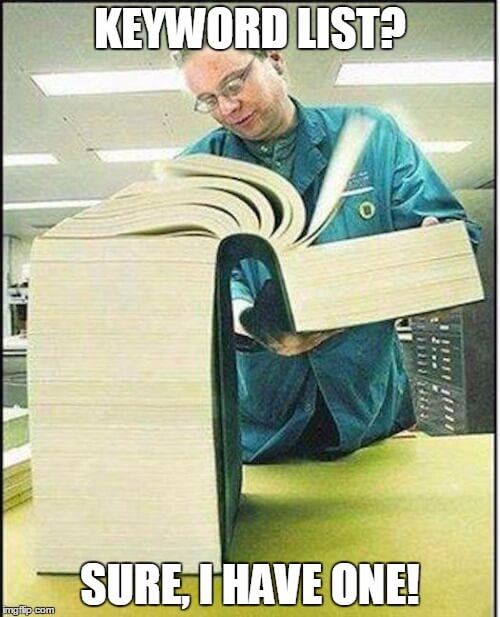
Target by demographics and interests to find the right type of people
Now you know not to be afraid of broader terms for niche industries and to segregate keywords by audience type but this is not the end of the story. Naturally, from looking at correlating interests, we know demographic and topic targeting will be very useful for niche industries.
Last year demographic targeting became available for search campaigns. This offers niche markets an even more granular view of their subculture. Advertisers can move beyond their assumptions and potentially outdated stereotypes and follow real data.
Thanks to advancements in the digital world, people are far more exposed to different products, services and genres. This means the way subcultures behave is changing and what you know about your target audience could be out of date.
By watching your campaign performance closely, you can soon see the age groups, marital status and genders your niche resonates best with and target them more aggressively.

Very niche industries should definitely consider moving beyond the search network. The GDN provides a great opportunity for niche advertisers struggling with low search volume terms. An image can speak a thousand words and that is why, especially for B2C products, Google Shopping and the GDN are powerful tools for niche industries. The GDN allows you to target by topic and placement, so you can reach those users with known correlating interests.

If you sell vegan cosmetic brushes, targeting topics and sites of correlating interests would be a great idea. Environmental topics and makeup and vegan cooking blogs may not seem to directly match but is likely their audience will be interested in your niche.
PPC strategies for niche industries
It is all well and good for niche markets targeting existing subcultures to use broader keywords, educational terms and demographics but what about brand new products and services?
For companies which have created product or service that is completely innovative and unique there is not even a subculture of people looking for your relevant terms. In this situation how can you utilise PPC effectively?
- Create the demand you desire
Niche marketing can use PPC to create demand. While there may be no conscious demand for your service/product and no search volume yet, you can use PPC as a pre-selling strategy to first generate awareness and interest.
This strategy can work wonders for both new products on the market and subculture based niche businesses.
This strategy does not aim to push conversions but to teach the population about your niche services/products. Your ads can push carefully crafted educational content so users can learn more about your niche. Then, when curiosity is peaked, search volume around relevant keywords keywords will increase.

Creative content like video demonstrations and quizzes work well for peaking interest.
In terms of keywords, world-first companies can look at solution providing terms. Your new service may not have search volume but it could have been developed to solve a need. If you have no competitors yet, look at services or products that are similar but inferior to your new product/service. Watch their review complaints and look at sites like Reddit and other forums to identify the need for your service. Copy the language people use when expressing the problem your amazing product/service solves.
With brand-new products on the market, niche business often need to get creative with their keywords to find any link e.g. fashion news, sports news, business entrepreneurs, nature. PPC can support and compliment major press releases and other PR in the build-up to your launch.
- Push micro-conversions
When running a campaign to generate demand/interest or when targeting mainstream convertors, you are looking at a longer conversion funnel. To make sure you are continually encouraging users down the funnel and increasing their knowledge, focus on micro-conversions rather than the big sell.
For users who have never heard of your product or are new to your niche, a purchase on the first encounter is unlikely but the offer of discounts, tutorials, free whitepapers and free demos can be enough to push micro-conversions like a sign up to your email list.
This allows niche marketers to lure users with educational information and then push to transactional pages later.
For new, curious users, it is fine to use forms and CTAs but be careful not to over-sell and repel them early on. It is beneficial to have separate landing pages for your awareness campaigns versus your conversion campaigns. Be especially cautious of annoying pop ups with CTAs. These will repel users who are high up the funnel in the learning phase and Google is trying to eliminate them if they interfere with content enjoyment.
Awareness campaigns are the perfect time to gather valuable tactics from your audience, while making them feel important. For ground-breaking products, ask your new email list what they would search for to find this product, what features they would appreciate, what would discourage them from buying. This will give you significant ammunition when the time comes to launch a follow up campaign focused on conversions.
- Beware of fads
When choosing to break into a niche subculture, businesses need to keep their wits about them. Fads can make or break a niche subculture.
Take a look at the Google Trends results over the last decade for several niche fashion subcultures.

Steampunk has seen a large increase. Lolita and Gothic fashion have seen slow declines. Cyber punk has seen a slow rise with a sharp spike a few years ago and clockpunk is virtually undiscovered in the search network for the time being.
By generating interest in a niche topic using PPC and other digital marketing methods, you can experience a surge. This can be a lasting increase in interest or a passing fad.
If a business chooses to enter a niche based on a temporary fad, it can be disastrous for that company when the fad wanes, if they did not diversify.
For those already in a niche industry, a lasting increase in interest can be highly profitable, if you continue to invest in your digital marketing but it does cause competition to surge along with interest.
Fads can also break a niche. Users are fickle and can abandon a subculture if it seems overdone. Sometimes the delight in a niche is the very fact it is niche. Damn those hipsters!

The worst thing a niche company can do is abandon their core fans after a fad. By working hard to create quality products and services you can always have loyal customers and smart digital marketing can continue to create new campaigns to re-new interest. If there is some demand, you can fill this small gap in the market and become the best in your niche industry by being loyal to your niche.
- Be a one-stop-shop
If you are going to be niche, do it well. Pick a subculture you understand and commit to it. Subculture fans love specialist sites who really know them and have everything they could ever want within that subculture. You will find, users will prefer your site to sites like Amazon, where they can only get one specialist niche item.
To defeat cheaper, open markets like Amazon, commit to your niche with quality, a simple navigation, sensible categorization of your niche products/services and an easy ordering service. Specialized customer service for your niche will set you apart from generalists.
Webpagefx show a great example of this. The ad below is targeting the niche market of left handed people with scissors designed especially for them:
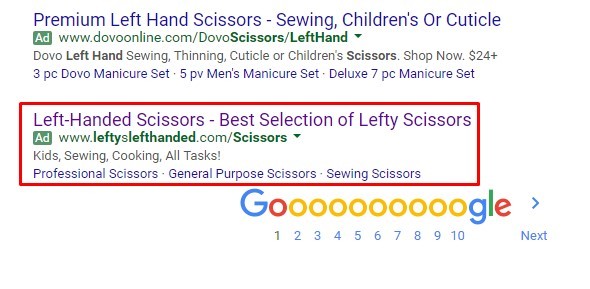
- Keep up to date
Small business in niche subcultures can rely too heavily on the loyalty of their following and the rarity of their products/services.
Niche businesses are often small, boutique companies with small marketing budgets. This combination can lead to a technology resistance. They can be slow to adapt to digital marketing strategies like PPC and mobile friendly sites, in the belief that they cannot afford it and their customers will put up with sub-par websites and marketing.
This attitude is poisonous for niche companies and in the end, it will lead to failure. As exposure to businesses all over the world grows, even niche subculture customers will expect more.

If you are niche you have the chance to target some great keywords with low CPC, due to low volume, so don’t hold back. New marketing technologies like paid social and video can be the perfect way to tap into more customers, so never sit on your niche laurels.
- Remarket
In a niche market advertisers should hold on tightly to their successful conversions. Encouraging a good repurchase rate with remarketing can often be easier and cheaper than generating new customers.

Remarketing is especially effective for niche markets, since it allows an array of targeting based on behaviour. With in-market and custom affinity audiences, remarketing can go beyond just targeting previous visitors to targeting your specific subculture, even when they are not searching for your products.
RLSA can also be a powerful asset to aid your repurchase rate. It will remind previous visitors of your brand the next time they search. RLSA is known for having higher CTRs and lower CPCs, as Search Engine Land’s data shows:

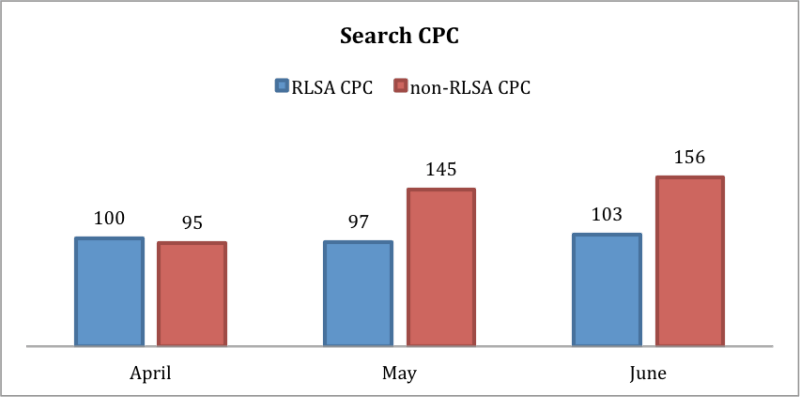
RLSA can go even further for niche businesses when combined with demographic targeting. Industry experts Wordstream point out that companies can gain an extra edge with RLSA if they utilise distributors who also practice RLSA:
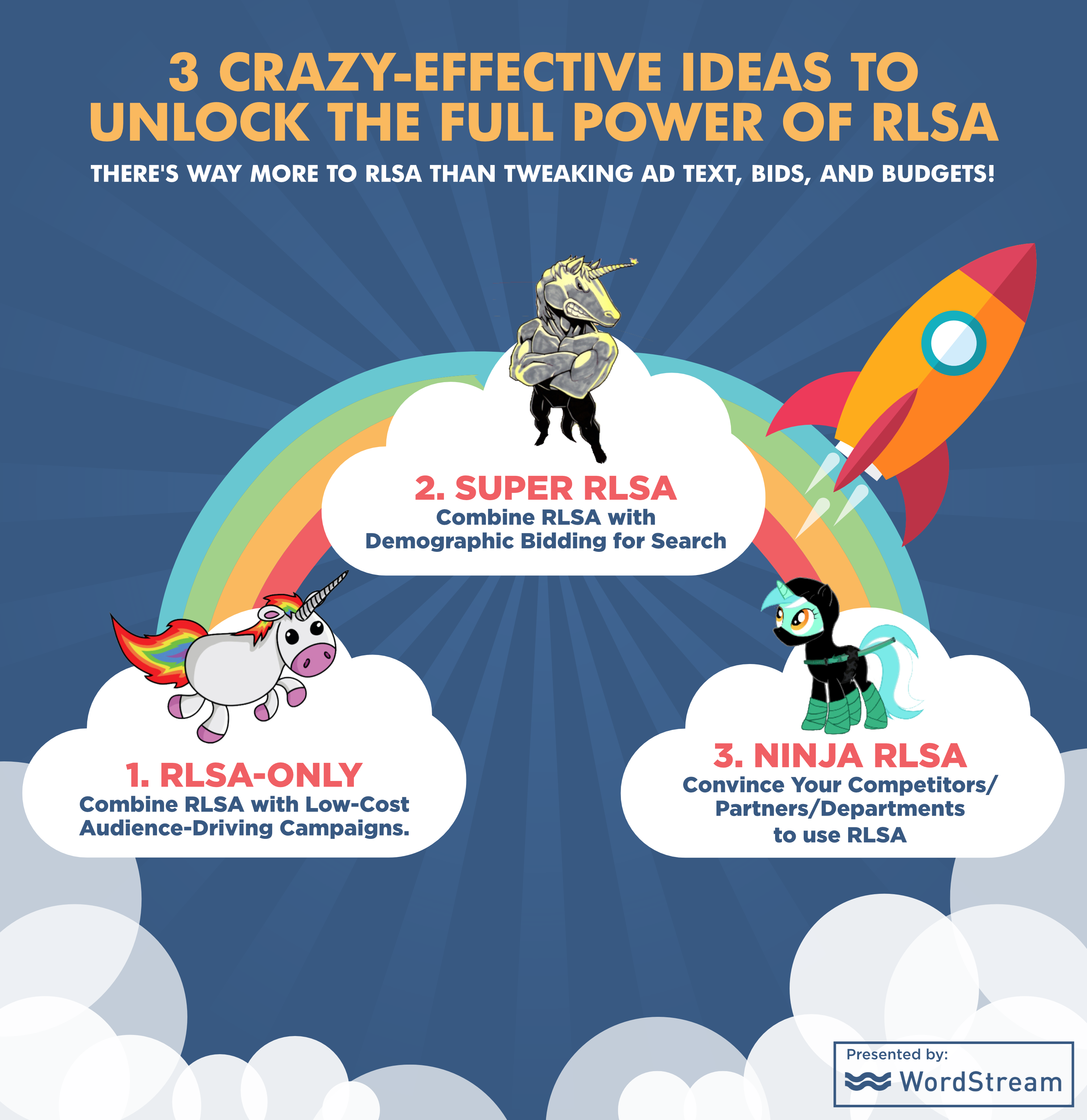
Incorporating RLSA and GDN remarketing campaigns will help niche industries reduce costs and increase conversions. It will mitigate some of the effects of having to broaden your keywords and make better use of those new fans. There is no use in attracting high funnel new fans unless you continue to market to them.
By following this strategy with remarketing to similar audiences, niche businesses can really expand their potential. Advanced Remarketing should be the bread and butter of niche marketing because it especially effective within niche interests.
Mind blowing copy for niche ads
You may have now noticed that a vital component of niche marketing is the ability to appeal to high funnel, low intent users.
The key to enabling low search volume niches to function in PPC search campaigns is the ability to wow someone, who may not have been searching for your niche.
Whether you’re a pioneering company with a brilliant new product or a niche subculture, your ads need to really make an impact with users. If you want to convince someone to click when they were not shopping for your service, your ad copy must be nothing short of exceptional.
It doesn’t sound easy but the “bizarreness effect” can be your golden strategy.
The bizarreness effect works on the premise that your ad is so strangely unique people cannot help but click. This does not mean using click bait but simply being fascinating. Being humorous or even slightly disturbing can be a good method, especially if it fits in with tone of your niche. Below on some truly brilliant examples of bizarre but enticing ads from eBay, Amazon and Hotels.kayak:

Using your best USPs, stats, prices and offer incentives are all useful tricks too but if you want to make waves with users unfamiliar with your niche, nothing grabs them like weirdness. While you may be concerned about your company image and tone, sometimes simply standing out is more important for niche companies to generate greater brand awareness.

Other options beyond AdWords
When your industry is niche and your search volume is low, PPC platforms like AdWords can help you gain some traction but one platform is rarely enough.
To reach the necessary conversions and presence, niche industries have to go where their potential fans spend their time and these days that is everywhere. In addition to AdWords, niche marketing should embrace Facebook ads, Instagram ads, Bing, the GDN, remarketing on all platforms and even video.
Niche marketing also needs to have strong content marketing and social marketing supporting its ongoing relationships with its special fans. Influencer marketing can be a big advantage which compliments your PPC because people trust recommendations.
Of course, niche marketing isn’t just useful for niche industries. More competitive industries can learn from the trials of niche marketing. Once you understand how to manipulate keywords, copy and strategies for niche markets, companies in highly competitive markets can use this to break into a smaller niche within their own field and benefit from the lower CPCs and better ROI.
